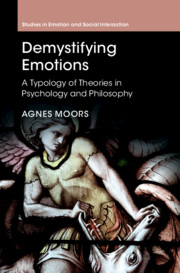Book contents
- Demystifying Emotions
- Studies in Emotion and Social Interaction
- Demystifying Emotions
- Copyright page
- Contents
- Figures
- Tables
- Boxes
- Preface
- Acknowledgment
- Abbreviations
- Part I Introduction
- Part II Emotion Theories One by One
- Chapter 3 General Precursors
- Chapter 4 Evolutionary Theories
- Chapter 5 Network Theories
- Chapter 6 Stimulus Evaluation Theories
- Chapter 7 Response Evaluation Theories
- Chapter 8 Psychological Constructionist Theories
- Chapter 9 Social Theories
- Part III Conclusion
- References
- Index
- Titles Published in the Second Series (continued from page ii)
Chapter 4 - Evolutionary Theories
from Part II - Emotion Theories One by One
Published online by Cambridge University Press: 11 August 2022
- Demystifying Emotions
- Studies in Emotion and Social Interaction
- Demystifying Emotions
- Copyright page
- Contents
- Figures
- Tables
- Boxes
- Preface
- Acknowledgment
- Abbreviations
- Part I Introduction
- Part II Emotion Theories One by One
- Chapter 3 General Precursors
- Chapter 4 Evolutionary Theories
- Chapter 5 Network Theories
- Chapter 6 Stimulus Evaluation Theories
- Chapter 7 Response Evaluation Theories
- Chapter 8 Psychological Constructionist Theories
- Chapter 9 Social Theories
- Part III Conclusion
- References
- Index
- Titles Published in the Second Series (continued from page ii)
Summary
This chapter discusses evolutionary theories in psychology (Ekman & Codaro, 2011; Levenson, 2011; Panksepp, 2012; Keltner, Tracy, et al., 2019), also known as motivational theories in philosophy. Building further on the bridging work of McDougall (1908), these theories propose the following causal-mechanistic explanation of emotion. Stimuli activate affect programs (another word for instincts specific to emotions), which in turn give rise to somatic and (subtle and coarse) motor responses and feelings. Some evolutionary theories are hybrids with stimulus evaluation theories in that they postulate that the affect programs is preceded by a stimulus evaluation process. The pure emotions caused by affect programs get mixed with learning and computation, which create flexibility on the input side (by elaborating the number of stimuli that can trigger affect programs) and on the output side (via emotion regulation and planning). Evolutionary theories account for the properties of ontogenetic and phylogenetic continuity, phenomenality, bodily aspect, heat, control precedence, and irrationality, but the non-hybrid version has difficulty accounting for the right kind of (world-directed) Intentionality. Evolutionary theories partition the set of emotions into discrete emotions. Empirical evidence pro and contra the existence of affect programs is discussed.
- Type
- Chapter
- Information
- Demystifying EmotionsA Typology of Theories in Psychology and Philosophy, pp. 113 - 146Publisher: Cambridge University PressPrint publication year: 2022



